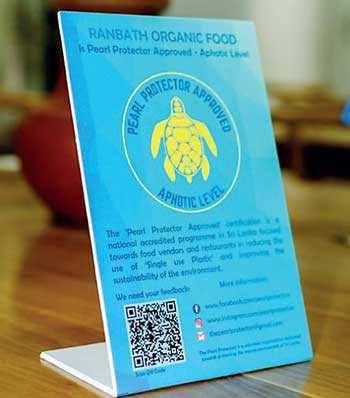Monday Feb 23, 2026
Monday Feb 23, 2026
Thursday, 19 December 2019 00:32 - - {{hitsCtrl.values.hits}}

By Maleesha Gunawardana
From the coral reefs to the denizens of the deep, life below water is in constant jeopardy due to the 8 million metric tons of plastics than enter the ocean annually, on top of the 150 million metric tons of plastics that are currently circulating. If the contemporary trends persist, ocean plastics will outweigh fish by 2050.
Owing to the health implications of micro plastic contaminants in seafood, humans are no longer immune to this threat. Regardless of the evident urgency for action, the Pearl of the Indian Ocean is yet to address the crisis at the grassroots. 
As single-use plastic bans gain momentum around the world, Sri Lanka struggles to walk-the-talk by succumbing to pressure from manufacturers and retailers. Accordingly, the three endeavours that comprised the ban on polythene, polystyrene-based packaging and cutlery continue to lack efficacious enforcement.
Ocean-minded consumers on the rise
On a positive note, there now exists a growing community of eco-conscious consumers. A key reason underlying this transformation is that unlike other dire environmental concerns, plastic pollution transcends beyond green circles to the public eye. In essence, the mismanaged mounds of waste affect the immediate environment of all citizens. The polluted canals, beaches, landfills and public places that hinder recreation, tourism and the standard of living are matters where ignorance is no longer bliss.
On account of the social media age and increased digital connectivity, movements such as the Trash Tag Challenge and Fridays for Future have been catalysts in cultivating a greener generation. Further, new media has played a pivotal role in emotionally engaging the audience on the horrific impacts that ocean plastics have on marine life. Devastating imagery of Albatrosses feeding on plastic bits from Sir David Attenborough’s Blue Planet II series, inspired masses to cut down on single-use plastics.
Consequently, with this ocean-minded change in demand, it has become a necessity as opposed to a choice for businesses to make ocean-friendly options available to customers.
Single-use items in the form of bags, ‘lunch sheets’, water bottles, sachets and food-packaging are the most prevalent types of plastics that sit on the once pristine beaches of Paradise Isle
A call for restaurants to swap from single-use to reusable
Single-use items in the form of bags, ‘lunch sheets’, water bottles, sachets and food-packaging are the most prevalent types of plastics that sit on the once pristine beaches of Paradise Isle. Among others, the accountability of restaurants and food vendors to such pollution is irrefutable.
Nevertheless, owing to the greater expense of acquiring reusable alternatives, restaurants who are willing to make changes find it difficult to strike a balance between the marine environment and financial gains.
For instance, a paper bag may approximately amount to three times the price of a plastic bag. Hence, a mechanism that narrows this intention-action gap is fundamental to ensure a smooth transition to eco-friendly alternatives. With this notion in mind, the Pearl Protectors, a volunteer-based team that strives to protect the Sri Lankan marine environment recently launched the ‘Pearl Protector Approved’ (PPA) Accredited Standardisation Certificate.
The certificate recognises restaurants and food vendors that cut down on single-use plastics, to drive up their customer base. Corresponding to the depth layers of the ocean, the PPA consists of the Euphotic Level, Disphotic Level and the Aphotic Level. A restaurant or food vendor may apply to be approved under one of the three pledges that they can adhere to. The certificate’s logo displays the image of a sea turtle to emphasise the need for its conservation as a species that is on the brink of extinction.
‘The Pearl Protector Approved’ Certificate
Euphotic Level
1. No plastic straws are being used by staff or provided to customers
2. No plastic bags are being used by staff or provided to customers
3. No plastic bottles are being used by staff or provided to customers
4. No plastic lunch wrappings are being used by staff or provided to customers
Disphotic Level (Inclusive of the Euphotic Level commitments)
1. No plastic cutlery is being used by staff or provided to customers
2. No plastic cups are being by staff or provided to customers
3. No plastic packaging of any item is offered to the customers
Aphotic Level (Inclusive of the Disphotic Level commitments)
1. Promotes and actively engages in recycling and reducing ‘Single-use Plastic’
2. Provides filtered water facility
3. Prioritises in segregating waste
Protecting the pearl through volunteerism
As a testament to the recent ranking of Sri Lanka as the number one country in the world by participation in volunteer time (The World Giving Index 2019), the Protectors of the Pearl also partake in coastal cleanups, trash tag challenges and eco-bricks workshops.
A campaign that certainly stands out is the building of a Christmas tree out of discarded plastic bottles accumulated from beaches. Commendably, this unusual tree constructed out of everyday items prompts a conversation about the plastic menace, particularly among children. The volunteer team is also working on conducting awareness sessions in schools to inspire the next generation of ocean heroes.
Since the sustainability of the ‘Pearl Protector Approved’ project depends on regular observation and awareness, volunteerism is a quintessential element behind its success. The volunteer group takes up the task of carrying out inspections to ensure that the restaurants are in accordance. ‘Ranbath Organics’ is the first restaurant under the certificate to accustom their operations.
Moving forward with positive reach, The Pearl Protectors plan to establish a platform that allows restaurants from outskirts of Colombo to apply and customers to write reviews that are vital in monitoring certified vendors.
Hopefully, pledging to harness the non-biodegradable waste that is being generated by the current dining culture will result in creating a ripple effect of inspiration to advocate for clean seas.
(The writer is an LLB undergraduate at the University of London (International Programmes) and can be contacted via [email protected].)